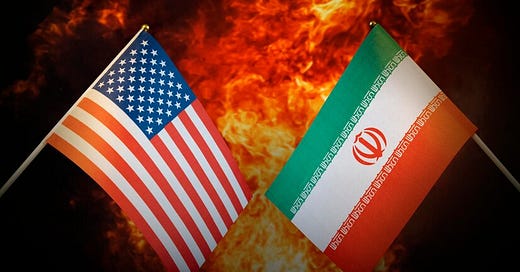Biden reversing on Iran deal would be a huge blunder
Biden betraying his deal with Iran: Why it's a bad idea for the US, Israel, and the Middle East
A month ago, President Joe Biden struck an unwritten agreement with Iran to lower tensions and rebuild confidence. But today, he seems to have reneged on it, as reported the Washington Post and New York Times.
The deal included releasing $6 billion of Iranian funds for humanitarian aid, among other reciprocal concessions. However, Secretary of State Blinken, who is in Tel Aviv, did not confirm that Iran would be cut off from the account. He said that “none of the funds that have now gone to Qatar have actually been spent or accessed in any way by Iran."
Biden has been under pressure from hawks in both parties who intensified their criticisms of the deal after the deadly attack on Israel by Hamas. But if Biden has indeed backed out of the deal, he will have made a huge blunder that could threaten the fragile peace between the US and Iran and spark a massive regional war.
This would of course not be the first time that the US has broken its promises to Iran. In 2018, former President Trump infamously pulled out of the Joint Comprehensive Plan of Action (JCPOA), the landmark agreement that was signed by Iran and six world powers in 2015 to limit Iran’s nuclear program in exchange for sanctions relief. Trump’s decision was widely condemned by the international community, including the other parties to the JCPOA: China, France, Germany, Russia, and the UK.
Trump’s withdrawal from the JCPOA backfired spectacularly. It did not force Iran to capitulate to his demands for a new and tougher deal. Instead, it pushed Iran to resume and expand its nuclear activities, reducing its breakout time to produce enough fissile material for a nuclear weapon from about a year to around 12 days by current estimates.
Trump’s withdrawal from the JCPOA backfired for Israel
Trump’s withdrawal from the JCPOA also harmed Israel’s security interests. Contrary to Trump’s claims that he was acting in Israel’s favor, many Israeli security experts warned that his move would make Israel less safe and more isolated. Earlier this year, four senior analysts from the AMAN unit’s Iran branch, the IDF’s intel division, offered their views on how the US withdrawal from the JCPOA was a “strategic mistake.” One Aman officer said, "Today, Iran poses a greater challenge for Israel due to nuclear issues and numerous points of friction."
Indeed, by withdrawing from the JCPOA, Trump triggered a series of negative consequences. He provoked Iran to resume and expand its nuclear activities, with it essentially now a threshold-nuclear-weapons state. He also emboldened Iran to increase its support for its allies and proxies in the region, such as Hezbollah in Lebanon, the Houthis in Yemen, and various militias in Iraq and Syria. He also heightened tensions between the US and Iran, leading to several incidents that brought them to the brink of war, such as the assassination of Iranian General Qassem Soleimani by a US drone strike in January 2020.
These developments have made Israel more vulnerable in the region. Israel now faces Iran-backed groups in four directions: Lebanon, Syria, Gaza, and Yemen. Israel also faces an Islamic Republic that can make a nuclear bomb in a short amount of time if it wants to.
The recent Hamas attacks on Israel also in part illustrate the negative repercussions of Trump’s withdrawal from the JCPOA for Israel. Although US intelligence sources have downplayed Iran’s direct involvement in the attacks, there is no doubt that Iran has provided Hamas with financial, military, and political support over the years.
The potential consequences of Biden’s decision: A new nuclear crisis and a regional conflict
Instead of listening to voices of reason, Biden appears to have followed Trump’s footsteps and betrayed his own deal with Iran. He seems to have caved into the pressure from hardliners in Washington, who have exploited the recent Hamas attacks on Israel as an excuse to sabotage any diplomatic engagement with Iran.
Biden’s apparent betrayal of his own Iran deal will have serious consequences for regional stability and global security. It sends yet another signal to Iran that the US cannot be trusted as a partner. It will likely result in Iran accelerating its nuclear program and retaliating against US interests and allies in the region.
Biden should reconsider his decision and re-engage with Iran on the basis of mutual respect and compromise. He should not let domestic politics or external pressure derail his vision for a more peaceful and stable Middle East. He should also work with other regional and international actors to address the root causes of the Israeli-Palestinian conflict, which is fueling resentment and radicalization among many Arabs and Muslims.
The US has a vital interest in preventing a war in the Middle East that could have devastating consequences for its own security and prosperity, as well as for its allies and partners. Biden has a chance to make history by restoring diplomacy and dialogue with Iran, and by advancing a just and lasting solution for Israel and Palestine. He should not squander it.





America HAD a tradition of never negotiating with terrorists...Obama tried with pallets of cash in the middle of the night, unmarked bills. Now Biden, who was VP at the time, is making a shift to unfreeze $6 Billion...negotiating with them to begin with was the blunder, not Trump’s decision to dismantle Americans role in it.